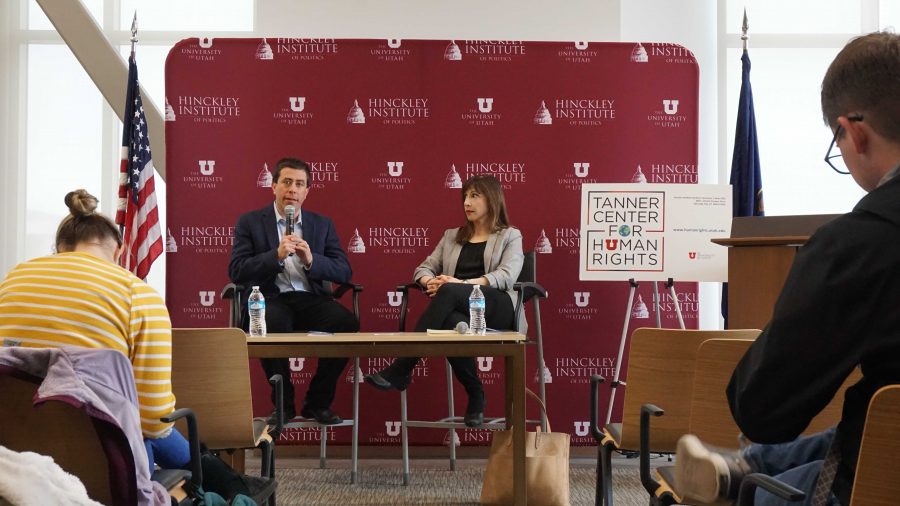The Hinckley Institute of Politics and the Tanner Center for Human Rights put on a Pizza & Politics event titled “Human Rights and the Humanitarian Crisis in Yemen.” The panel featured two speakers who shared information about the crisis in Yemen. The first in the panelist was Scott Paul, the humanitarian policy lead for Oxfam, an organization which focuses on what drives political violence and vulnerability and aims to end poverty worldwide.
The second panelist was Andrea Prasow, deputy Washington director of Human Rights Watch. According to the Hinckley Institute, Prasow has “investigated and analyzed U.S. national security policies and practices and led advocacy efforts urging executive and legislative branch officials in Washington to implement national security policies that respect internationally-recognized rights. Prior to joining Human Rights Watch, Prasow was a defense attorney with the Office of Military Commissions and was an associate at Paul, Weise, Rifkind, Wharton & Garrison LLP where she served as habeas counsel for Saudi detainees at Guantanamo.”
Paul spoke first and mentioned that he wanted “to break down in more detail why people are suffering.” He remarked that Oxfam “fight[s] the injustice of poverty” because poverty isn’t an issue of resource allocation, but instead is an issue of power. The humanitarian crisis stems from people’s choices. “None of the people are in crisis because of any natural hazard … there is a war, and the people fighting it don’t care enough to let people survive,” Paul said.
He advised those in attendance to think more critically about the pictures they see publicized by the media from the conflict.
“When we see a picture of a child with a drip suffering from acute malnutrition, we should remember who is surrounding them.” It is likely that the child’s parents had to transport them to another village to be able to find health care because “more than half of health facilities have been damaged or destroyed.” As a result of the travel time, both parents would be unable to earn an income for that day. He also stressed multiple times throughout the presentation that “the U.S. has an enormous amount of leverage that they refuse to use.”
Prasow focused on accountability for actors in the conflict and how to engage in war lawfully. She stressed how important it was for the actors to be held accountable for their actions. She said, “If they aren’t held accountable now then I believe we will be hearing these stories again 30 years from now.” When talking about the legality of war, she said, “Unfortunately, it is lawful for civilians to be killed [in a conflict], but they can’t be targeted.” However, “mistakes do happen at war. What we expect is an apology and some sort of redress.” In the past, uniformed personnel would apologize to the families of the victims and offer some compensation, but now there is mostly denial.
She continued by explaining that the U.S. continues to support Saudi Arabia and the UAE with moral support, but they have essentially shown that nothing Saudi Arabia does will change that support. This makes the Saudis feel that they don’t have to answer to the international community. The lack of accountability will also make it difficult for citizens to rebuild their lives after the conflict. The Human Rights Watch has also “documented torture in detention” facilities.
Both speakers concluded that there is a long way to go before peace in the region can happen. “Yemen has not had peace for a very long time,” Paul said. “There won’t be peace for a long time, but an agreement between the parties will rescue millions of people from humanitarian crisis. The negotiations aren’t working because the international community is calling for peace and the defeat of one party at the same time, and that isn’t going to work.” However, Prasow pointed out that progress is being made because “we are finally reaching a point after four years when people are willing to talk about Yemen in a non-partisan basis.”


